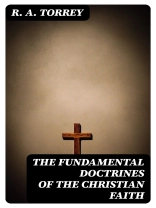In ’The Fundamental Doctrines of the Christian Faith, ’ R. A. Torrey meticulously explores core theological principles that undergird Christianity. The book is an articulate synthesis of systematic theology, presented in a straightforward and accessible manner that reflects Torrey’s evangelical convictions. Engaging with scriptural texts, Torrey tackles essential doctrines such as the nature of God, the authority of Scripture, and the significance of Christ’s resurrection. His writing combines rigorous doctrinal analysis with an earnest appeal for spiritual awakening amidst the modern challenges of secularism, positioning the work within a broader context of early 20th-century American evangelical thought. R. A. Torrey, a prominent evangelist and theologian, was deeply influenced by the revivalist movements of his time. His background in the study of the Bible and his commitment to evangelism motivated him to pen this work as a clarion call for clarity in Christian belief. Torrey’s significant roles, including being the first Dean of the Bible Institute of Los Angeles, reflect his dedication to teaching foundational Christian tenets to a generation increasingly swayed by doubt and skepticism. For scholars, students of theology, and lay readers alike, this book serves as an invaluable resource. Torrey’s comprehensive examination of essential doctrines will enrich one’s understanding and appreciation of Christianity’s foundational beliefs. Whether you are seeking to strengthen your faith or clarify your understanding of church doctrine, this work stands as a vital guide through the complexities of Christian theology.
Om författaren
Reuben Archer Torrey (1856–1928), more often known as R. A. Torrey, was an American evangelist, pastor, educator, and writer. Torrey graduated from Yale University and Yale Divinity School. After a period of skepticism, he embraced evangelical Christianity and became a powerful preacher, eventually serving as a superintendent for the Moody Bible Institute in Chicago and later as pastor of the Moody Church. His extensive career in evangelism led him to travel the world, preaching in countries such as Australia, New Zealand, Britain, and China. Torrey’s literary contributions left a significant impact, particularly in Christian fundamentalism, where he was an ardent defender of Biblical inerrancy. One of his notable works, ’The Fundamental Doctrines of the Christian Faith’ (1918), distills essential Biblical doctrines into an accessible format, affirming the conservative theological positions that characterized the fundamentalist movement of his time. Moreover, his writings are characterized by a straightforward, clear, and practical style, aimed at the layperson as well as the clergy. His literary works continue to be read and appreciated for their depth of insight and adherence to the evangelical truths he staunchly supported.












